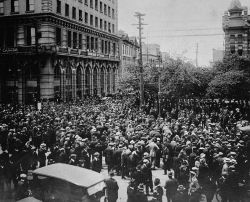Halifax Media Co-op
News from Nova Scotia's Grassroots
Recognizing Our Interests: A Wider Perspective on the HRM Transit Strike
By Jason Edwards
Over the past few weeks labour-relations issues have dominated the news in Atlantic Canada. We saw the lockout of Acadian Lines workers in late November, and since then there has been talk of stalled contract negotiations for municipal water workers, airline employees, professors and others. Contracts will have to be negotiated between Nova Scotia’s district health authorities and all fifty of the collective units they employ. Now, with HRM Regional Council refusing to go to binding arbitration, Halifax’s almost eight-hundred transit workers remain unable to work.
To the detached observer, labour issues often evoke passionate, yet unapprised opinions. It’s not uncommon to hear or read responses rife with mindless platitudes about greedy union members and their elite leaders. As with most right-wing political positions, the dissemination of anti-labour sentiment rests on twin pillars: myth and emotion.
When it comes to labour relations, the public seems to suffer from a deficit of historical perspective, resulting in an acute case of chronic misinformation. Too often people fail to see how their own self-interest is inextricably linked with that of labour as a whole. Ignorance performs its most outstanding feat when it compels non-union workers to channel their discontent against their organized peers.
To paraphrase the common sentiment of university-educated, unorganized workers: “I went to school for four years longer than they did, but they still want to earn a decent living? Preposterous! I’m not rich, so they should be poor!”
My response to this is simple. Yes, unions are a human institution, and are thus greatly flawed. However, unless you are one of the few individuals who earns his/her living from the ownership of capital, your self-interest is the same as that of all other working people. In the long-term, lowering the wages of other workers only benefits people who do not have to rely on selling their labour to survive. While this may seem like an over-simplification, there is ample evidence proving a dichotomy between workers and owners exists to this day. No matter who you are, you are either a worker or an owner. My bet is you’re probably a worker.
The quality of life for all working Canadians is inextricably linked to the gains of labour. This trend began in the early 1900s, when organized labour fought to overcome the worst excesses of unbridled capital accumulation. The Royal Commission on the Relations of Labour and Capital, held by Parliament in 1889, provides ample evidence of life without organized labour:
“Many children of tender age, some of them not more than nine years old, were employed in cotton, glass, tobacco and cigar factories… Some of them worked from six o’clock in the morning till six in the evening, with less than an hour for dinner… The darkest pages in the testimony are those recording the beating and imprisonment of children employed in factories.” (page 118)
These trends were not overturned at the will of capital and the state. Lives of union and non-union workers alike were improved only when pressure was put on owners and politicians by labour militancy.
The first minimum wage, (page 119) for example, was accepted by business leaders as a viable policy option at the 1919 National Industrial Conference. Anyone with a cursory understanding of Canadian social history will recognize this as the year that labour militancy erupted in the Winnipeg General Strike, where the city’s workers came together in a massive act of organic solidarity to contest poor wages and working conditions amid massive WWI profiteering.
Similarly, programs like health care, public pensions, employment insurance, etc., were not the gifts of benevolent elites.
Public healthcare was the result of growing grassroots efforts to pool resources, and was advocated by organized labour piece-by-piece as it grew in scope through the postwar era. While Tommy Douglas is credited as the creator of Medicare, his political success hinged on the support of unions. The CCF was a socialist party, supported primarily by labour and farmers.
The entire spectrum of policies that support working Canadians’ quality of life can be attributed to the pressure exerted by organized labour on reluctant state and business elites. Whether or not you are in a union, your quality of life relies on their ability to push back against the “race to the bottom” that is such a salient feature of the global, under-regulated market.
It is no coincidence that, as union-density grew over the course of the 1950s, 60s, and early 70s, so did average wages. When union-density proceeded to fall in the 1980s and 90s, wages stagnated and the low-wage sphere expanded.
The “us against them” mentality is an easy trap to fall in to. The right uses misinformation to channel peoples’ base emotions against their own interests. If we are going to construct a more informed dichotomy between social groups, it should account for actually-existing antitheses.
The “us” is all the working-class, while the “them” is the ownership-class. If you make $60,000 over the course of a year by working fifty, forty-hour weeks, you’re probably in the “us”. If you can make $10 million over a year, benefiting from massive tax-cuts, while putting hundreds of people out of work despite earning record profits, you’re probably in the “them”.
So, Haligonians, whether you are unionized or non-unionized; whether you are private or public-sector; regardless of how much education you have; whatever the colour of your collar; and no matter how inconvenient it is for you to find an alternative mode of transportation, if you work for a living your lot rests with the transit workers.
Jason Edwards writes for Maritime Perspective, where this piece originally appeared. Follow him on Twitter: @JEdwardsNS
The site for the Halifax local of The Media Co-op has been archived and will no longer be updated. Please visit the main Media Co-op website to learn more about the organization.



